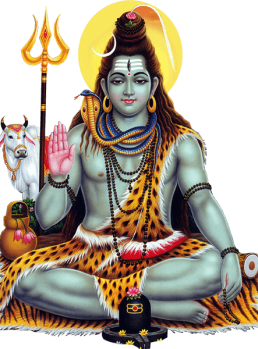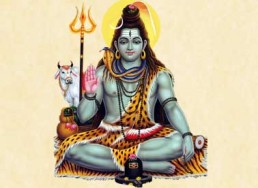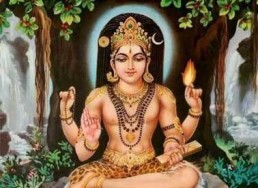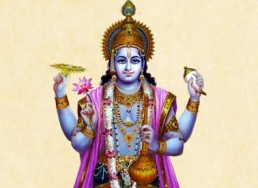Anayasena Maranam
देहि मे कृपया शम्भो त्वयि भक्तिं अचन्चलं ॥
(or)
अनायासेन मरणं विनादैन्येन जीवनं ।
देहान्ते तव सान्निध्यम् देही मे परमेश्वरम ॥
dehi me kṛpayā śambho tvayi bhaktiṃ acancalaṃ ..
(or)
anāyāsena maraṇaṃ vinādainyena jīvanaṃ .
dehānte tava sānnidhyam dehī me parameśvarama ..
(or)
O Lord Shiva, please grant me a peaceful death without pain (Anasayena Maranam), a life without any trouble or dependence on others for my basic needs (Vina Dhainyena Jeevanam) and when my soul leaves this body, I must only remember You dear Lord (Dehante tava Sanityam).

Description
1) A painless, peaceful trouble-free death
2) A life without shortage for my basic needs (as long as I am alive, please let me have the dignity to be able to live a life where I do not have to go beg for resources from others. Let there be enough when I truly need it in my life).
3) A life filled with total, unwavering devotion towards you and when my soul leaves this body, I must only remember you.
The 3rd request is key. When my soul leaves this body, I must only remember you. Because if you don’t remember the Lord at the moment of death, it means you are remembering something else. And whatsoever, whosoever we remember at the moment of death has a direct impact on where we end up in the next birth. Lord Krishna states this clearly in the Bhagavad Gita, Chapter 8: Verse 6:
yaṃ yaṃ vāpi smaranbhāvaṃ tyajatyante kalevaram
taṃ tamevaiti kaunteya sadā tadbhāvabhāvitaḥ
Whosoever, at the end, leaves the body, thinking of any being, to that being only he goes, O son of Kunti, because of his constant thought of that being.
For most people, as the body is about to die, there is usually pain, sometimes extreme. There is fear, worry. There is loss of memory, loss of consciousness. Or there is a deep concern for loved ones, property, business etc, etc. We can now see how difficult it is to remember God at that time. Especially at the final moment, at that last breath. Therefore one has to start thinking of the Lord or repeating his Name, as early as possible in life so that it becomes a deep-rooted habit. Now, one might think, I will start thinking of the Lord once I am older and closer to death. It doesn’t work that way. The mind forms deep channels of whatever habitual thoughts repeat themselves. Therefore Iswhara Smaranam – remembering the Lord has to be done continuously. That’s why Hindus name their children after God, so that each time they call them, knowingly or unknowingly they are calling the Lord’s name. As we make it a habit to take frequent breaks during the day to remember His form or remember His name, or remember His attributes, it slowly gets ingrained in us. Even in our sleep when we start to see the Lord in our dreams, that is a good sign. After all, death is nothing but an extended sleep between births. Thus, the only way to remember the Lord at the exact moment of death, is to practice doing it continuously now. Hence we pray for a life filled with devotion. This prayer is a great way to remember the Lord.
Another version
Also referred to as Drona Sthuthi, ascribing it to the prayer of the great Sri Dronacharya to Lord Krishna. Other references ascribe this prayer as Sri Vidhura’s to Lord Krishna.
Anayasena maranam |
Vina dainyena jivanam ||
Dehi me krpaya krsna |
Tvayi bhaktimacancalam ||
Other Shiva Shlokams
Aksharamalika Shiva Stotram
Also called the Shiva Akshara Mala Stotram, this is a very popular prayer addressed to Lord Shiva. Each verse starts in the order of alphabets in Sanskrit.
Ardha Narishvara Stotram
Shri Ardhanareeshwara Stotram was composed by Sri Adi Shankara bhagavatpada. Creator and Creation are One ~ Ardhanarishwara, composite of Shiva and Shakti together in one body.
Bhoothanath Ashtakam
The Bhoothanatha Ashtakam composed by Shri Krishnadasa is a devotional hymn that glorifies Lord Shiva in his form as Bhoothanatha, the Lord of all beings, spirits, and the cosmos.
Bilvashtakam
Composed by Sri Adi Shankaracharya, the famous Bilvashtakam extols the virtues of the Bilva leaf (also spelt Vilva, Bilwa) and Lord Shiva’s love for it. The following com
Bilvashtakam 14 Verses
Note: For the original version of Bilvashtakam please click here. Composed by Sri Adi Shankaracharya,
Chandrashekhara Ashtakam
Chandrashekhara Ashtakam is a divine hymn to praise God Shiva as Chandrasekhara, the lord who is adorned with moon on his head (Chandra – moon, Sekhar – crown) and to seek refuge from untimely death.
Dakshinamurthy Stotram
Shlokams,Sankara,Shiva,Dakshinamurthy
The Dakshinamurti Stotra is a Sanskrit religious hymn to Shiva by Sri Adi Shankaracharya. It explains the metaphysics of the universe in the frame of the tradition of Advaita V
Ishvaro Guru Atmeti
Shlokams,Shiva,Dakshinamurthy,Guru,Sankara
Salutations to Lord Dakshinamurti, who is all-pervasive like space but who appears (as though) divided as Lord, Guru, and the Self.
Kalabhairava Ashtakam
Composed by Sri Adi Shankaracharya. The hymn illustrates the personality of Kala Bhairava of Kashi, the God of Death(kala). Those who study these 8 verses on Kala Bhairava, which are enticing and whic
Karacharana Kritam
O Lord, kindly forgive all the wrong acts and omissions I have committed, whether I committed them knowingly or unknowingly, with my hands, feet, words, ears, eyes, or mind. Glory to you, Mahadeva, wh
Karpura Gauram
Pure white like camphor, an incarnation of compassion, the essence of worldly existence, whose garland is the king of serpents, always dwelling inside the lotus of the heart. I bow to Shiva and Shakti together
Kasi Viswanathashtakam
Composed by Sri Adi Sankaracharya in praise of Lord Shiva. That man who reads this octet with its meaning, which sings the praise of Shiva who is the lord of Varanasi, would get knowledge, wealth, gre
Lingashtakam
The Lingashtakam is one of the most popular Ashtakams(a Stotram with 8 verses) dedicated to Lord Shiva which praises Him in the abstract "Lingam" form.
Maha Shivaratri
Significance of Ganesh Puja, Vinayaka Chavithi or Chathurthi. See how to prepare for Ganesha Pooja, How to perform the Puja with Video instructions and enjoy Audio devotional songs, uninterrupted and without ads.
Mantra Pushpam
The Mantra Pushpam (literally translating to "Flower of Mantras") is a collection of sacred verses from the 10th chapter of Taittiriya Aranyaka of Krishna Yajur Veda. Each verse begins with an exploration of the relationship between the flower of…
Margabandhu Stotram
This great Stotra Rathna was written by Appayya Deekshitha(1520-1593). He was one of the great interpreter of Advaitha Sidhantha after Adi Sankara. This stotra is written in praise of the Lord Margaba
Mauna Vyakhya
Shlokams,Sankara,Shiva,Dakshinamurthy
I salute Sri Dakshinamurti, who is not subject to time, who makes known the truth of Brahman through the implied meaning of words, who is surrounded by disciples who are themselves Rishis and committe
Mruthyunjayaya Rudraya
Salutation to you Mrithyunjaya, Rudra, Nilakanta, Shambhu & the lord of immortals and this great lord of all beings.
Namaste astu bhagavan
Morning prayer. From Devi Mahatmyam. The Devi Mahatmyam is a Hindu religious text describing the Goddess as the supreme power and creator of the universe. It is part of the Markandeya Purana, and esti
Nidhaye Sarvavidyanam
Shlokams,Sankara,Shiva,Dakshinamurthy
Salutations to Sri Dakshinamurti, the reservoir of knowledge (the abode of all learning), the healer of all those who suffer from the disease of samsāra, and the teacher of the whole world.
Om Namah Pranavarthaya
Shlokams,Sankara,Shiva,Dakshinamurthy
Om. Salutation to the one who is the meaning of praņava, who is in the form of pure knowledge, who is taintless and who is free from any change. To that Sri Dakshinamurti, (my) salutations.
Om Namo Bhagavate Dakshinamurthaye
Shlokams,Sankara,Shiva,Dakshinamurthy
Om. Salutations to Bhagavan Dakshinamurti. (Oh Lord) Bless me with memory, the capacity to think properly, and clarity, wisdom.
Rudra Ashtakam
The famous Rudrashtakam extols the many qualities of Shiva. This is composed by Sri Goswami Tulsidas. Rudra is considered as the fearsome manifestation of Shiva. Rudrashtakam has its origins in the Ra
Rudram Chamakam
The Chamakam portion of the Sri Rudram is a profound and structured Vedic prayer that follows the Namakam, extending the worship of Lord Rudra (Shiva) by asking for blessings and the fulfillment of various needs. Unlike the Namakam, which focuses on…
Rudram Chamakam Meaning
The Chamakam portion of the Sri Rudram is a profound and structured Vedic prayer that follows the Namakam, extending the worship of Lord Rudra (Shiva) by asking for blessings and the fulfillment of various needs. Unlike the Namakam, which focuses on…
Rudram Laghunyasam
Laghunyasam is a preliminary Vedic chant traditionally recited before performing the Sri Rudram to purify and align the body, mind, and spirit with divine energy. The term "Nyasam" refers to a process of mentally assigning or dedicating various…
Rudram Laghunyasam Meaning
Laghunyasam is a preliminary Vedic chant traditionally recited before performing the Sri Rudram to purify and align the body, mind, and spirit with divine energy. The term "Nyasam" refers to a process of mentally assigning or dedicating various…
Rudram Namakam
The Namakam portion of the Sri Rudram, also known as the Rudra Prashna, is a profound and intricate Vedic hymn found in the Krishna Yajurveda, specifically within the Taittiriya Samhita (Book 4, Chapter 5). The term Namakam is derived from the…
Rudram Namakam Meaning
The Chamakam portion of the Sri Rudram is a profound and structured Vedic prayer that follows the Namakam, extending the worship of Lord Rudra (Shiva) by asking for blessings and the fulfillment of various needs. Unlike the Namakam, which focuses on…
Shambu Devam Sakalajagatam
I sing in praise of God Shambhu, the Lord of all worlds, and the three-eyed one; the consort of Gauri, the grantor of happiness, blessings and gifts, the one with the moon as his crest-jewel.
Shambu Stuti
A stuti on lord Shiva composed by lord Rama himself. Lord Rama recites this at Rameshwaram when faced with the near impossibility of crossing the vast ocean to reach Lanka, he prayed intensly to Lord
Shiva Aparadha Kshamapana Stotram
The Śiva Aparādha Kṣamāpaṇa Stotram, or "Hymn of Forgiveness for Offenses to Lord Śiva," is a heartfelt composition by the revered philosopher and saint Śrī Ādi Śaṅkarācārya. T
Shiva Ashtakam
Composed by Adi Shankaracharya. This ashtakam is a descriptive salutation of the different attributes of Shiva. The great yogi who is referred to as Ardhanarishwara (the one who has included the femin
Shiva Mahimna Stotram
The Shiva Mahimna Stotra is very popular among the devotees of Lord Shiva and is considered one of the best among all Stotras (or Stutis) offered to Lord Shiva. The legend abou
Shiva Mahimna Stotram Meaning
The Shiva Mahimna Stotra is very popular among the devotees of Lord Shiva and is considered one of the best among all Stotras (or Stutis) offered to Lord Shiva. The legend abou
Shiva Manasa Puja
Sri Adi Shankaracharya composed this mantra for lord Shiva. Using this stotra, we can perform mental worship of Lord Shiva.
Shiva Panchakshara Stotram
The famous Shiva Panchakshara Stotram praises Shiva and the power of the five sacred syllables, na-ma-shi-va-ya.
Shiva Pratah Smaranam
This is a short and beautiful 'Three Shloka Prayer' that makes the start of the day full of energy and happiness. Composed by Sri Adi Shankaracharya.
Shiva Sahasranama Stotram
Also called the Shiva Akshara Mala Stotram, this is a very popular prayer addressed to Lord Shiva. Each verse starts in the order of alphabets in Sanskrit.
Shiva Shadakshara Stotram
In this Hexa-Syllabic Hymn, there is a single stanza mantra for each letter of Aum-Na-Ma-Shi-Va-Ya. This mantra is found in Rudrayamala Tantra text.
Shiva Tandava Stotram
Shiva Tandava Stotram The Shiva Tandava Stotram is a deeply powerful and rhythmic hymn that glorifies Lord Shiva's cosmic dance, known as the Tāṇḍava. It is traditiona
Tatpurushaya Vidmahe Rudra Gayatri Mantra
Om. May we know that Lord Isvara, for which may we meditate upon Mahadeva. May that Rudra impel us (towards him).
Tryambakam Yajamahe
We worship Lord Shiva the three-eyed one, the one who is the master of all senses and qualities and the one who is the sustainer of all growth. May he release us from the bondage of death, just as a r
Vagarthaviva Sampruktau
Kalidasa prays to the divine parents Paarvathi & Parameshwara who are inseparable like the word and its meaning, in order to guide him in acquiring the power of words and their meanings (literature) as he embarks on the Mahakavya, Raghuvamsa.
Vande Shambu Umapatim
I salute Shambu, Umapati, the preceptor (teacher) of devas, I salute the cause of the earth, I salute the one ornamented with the serpent, the wearer of the moon, I respect that master of all beings.
Vedasara Shiva Stava
Composed by Sri Adi Shankaracharya in praise of Lord Shiva - the essence of vedas.
Anayasena Maranam – Shiva – With English Transliteration, Translation and Meaning. Commentary for selected Shlokams.



